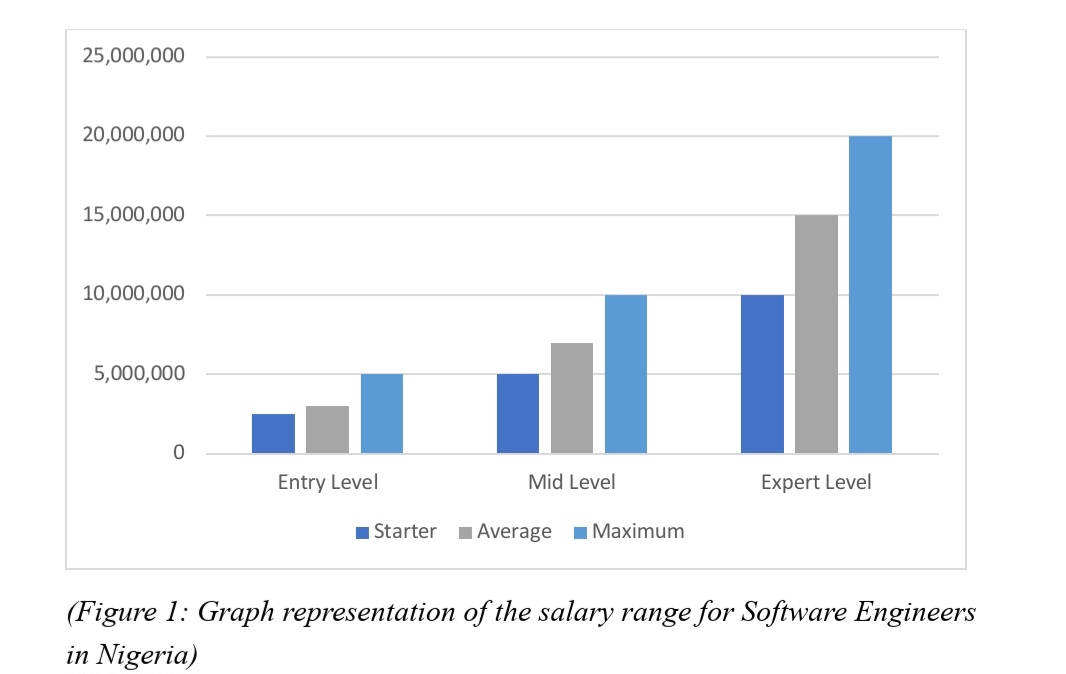 With Nigeria’s burgeoning tech scene and the continuous pursuit of digital advancement, the demand for skilled Software Engineers is witnessing a steady rise. Let’s delve into the salary dynamics of Software Engineers from the entry level to highest rank software engineers in Nigeria for the year 2020.
With Nigeria’s burgeoning tech scene and the continuous pursuit of digital advancement, the demand for skilled Software Engineers is witnessing a steady rise. Let’s delve into the salary dynamics of Software Engineers from the entry level to highest rank software engineers in Nigeria for the year 2020.
The Tech Surge and Its Influence on Software Engineering Roles
Nigeria’s tech sphere is experiencing a significant boom, paralleling the global trend of digitalization. Factors such as increased internet accessibility, a burgeoning young population, and governmental initiatives fostering technological innovation have contributed to a vibrant tech ecosystem in Nigeria.
Within this milieu, the role of Software Engineers has become increasingly vital as companies strive to innovate and remain competitive in the market.
Defining the Software Engineer Role
Software Engineers in Nigeria undertake multifaceted responsibilities, encompassing the development, maintenance, and optimization of software systems. They collaborate with cross-functional teams to ensure the seamless functioning of digital products and services. This role demands a blend of technical expertise, problem-solving abilities, and effective teamwork.
Elements of a Software Engineer’s Compensation in Nigeria
Base Salary:
The cornerstone of a Software Engineer’s compensation package is the base salary. This figure varies depending on factors such as company size, industry, and the engineer’s level of experience. In Nigeria, entry-level Software Engineers typically earn between ₦2,500,000 to ₦5,000,000 annually, while mid-level professionals with 3-5 years of experience may command salaries ranging from ₦5,000,000 to ₦10,000,000 annually. Seasoned experts in the field can earn between ₦10,000,000 to ₦20,000,000 annually.

Bonuses and Incentives:
Many companies offer performance-based bonuses and incentives tied to individual or team achievements, augmenting the overall compensation package for Software Engineers.
Stock Options:
In a startup establishment, Software Engineers may be granted stock options, aligning their incentives with the company’s growth trajectory. This practice is particularly prevalent in technology firms and can significantly bolster their overall earnings.
Remote Work Opportunities:
With the growing acceptance of remote work, Software Engineers in Nigeria may explore opportunities to collaborate with international companies, which can offer competitive salaries and additional benefits.
Factors Influencing Software Engineer Compensation
Several factors contribute to the variance in compensation for Software Engineers in Nigeria:
Experience and Specialization:
The level of experience and specialization in software engineering greatly impacts an individual’s earning potential. Engineers with extensive experience and expertise in niche areas may command higher salaries.
Industry Demand:
The demand for software engineering skills varies across industries. Sectors experiencing heightened demand for digital solutions, such as technology, fintech, and e-commerce, often offer competitive compensation to attract top talent.
Educational Background:
Software Engineers with advanced degrees or specialized certifications tend to earn higher salaries. Continuous learning and staying abreast of technological advancements are instrumental for career progression in this field.
Geographical Location:
Compensation levels may vary based on the geographical location of the employer. Software Engineers working in major business hubs like Lagos or Abuja typically receive higher salaries compared to those in smaller cities.
Future of Software Engineers in Nigeria
As Nigeria continues its journey towards digital transformation, the demand for skilled Software Engineers is poised to escalate. This rising demand is expected to drive competitive salaries, rendering the field increasingly attractive for individuals pursuing a career in software engineering.
The salary dynamics of Software Engineers in Nigeria underscore their pivotal role in driving technological innovation and propelling business growth. With a blend of technical prowess, innovation, and adaptability, Software Engineers in Nigeria are well-positioned to shape the future landscape of the country’s tech industry.






